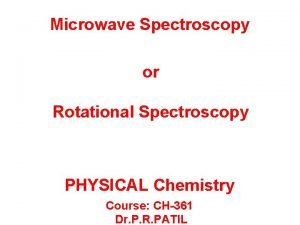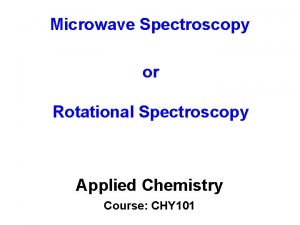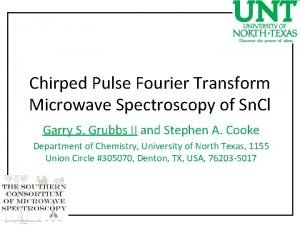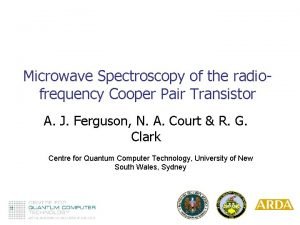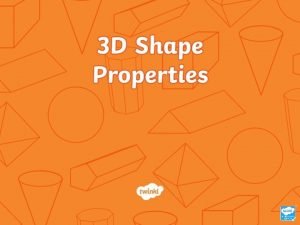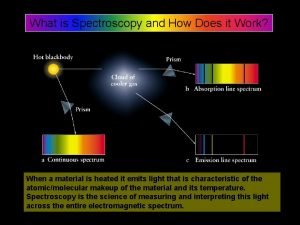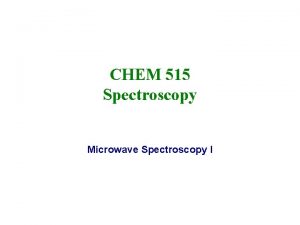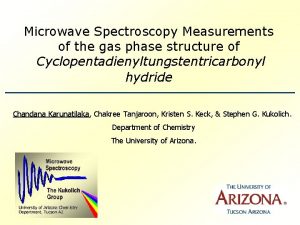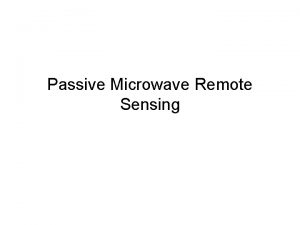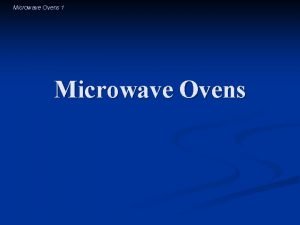MICROWAVE STRUCTURE MEASUREMENTS Q Microwave spectroscopy measurements have



![Homodyne system greatly simplifies the microwave circuit, with no apparent loss in sensitivity[1] Rest Homodyne system greatly simplifies the microwave circuit, with no apparent loss in sensitivity[1] Rest](https://slidetodoc.com/presentation_image_h2/99def2ece36c123bcde502c6ed110f21/image-4.jpg)

- Slides: 5

MICROWAVE STRUCTURE MEASUREMENTS Q Microwave spectroscopy measurements have yielded the first accurate gasphase structural parameters for Os(CO)4( 2 -C 2 H 4), tetracarbonylethyleneosmium[i]. Q The deformation of the ethylene ligand upon coordination to osmium is large, well-determined and supports the DCD model. The new experimental ethylene C—C bond length of 1. 43 Å for the complex falls between the free ethylene average rz (C=C) value of 1. 339(1) Å and the r 0(C—C) bond length of 1. 534(2) Å for ethane. The C—C bond length for the Fe congener is 1. 421(7) Å. Q The angle between the plane of the CH 2 group and the C—C bond ( out-ofplane) is 26°. This angle is 22° for Fe(CO)4(C 2 H 4), indicating that the degree of metal (d ) olefin ( *) back-bonding is greater for the Os complex. Q A homodyne-type detection system, was developed for our pulsed-beam Fourier transform spectrometer system and used for these measurements. This homodyne system greatly simplifies the microwave circuit, with no apparent loss in sensitivity. [i] C. Karunatilaka, B. S. Tackett, J. Washington, and S. G. Kukolich, J. Am. Chem. Soc. 129(34), 10522 -10530 (2007) (doi: 10. 1021/ja 0727969 S 00027863(07)02796 -5). ACS - PRF 1

Ethylene Structure Changes on Complex Formation ACS - PRF 2

DCD Model for Alkene-Metal Complexes Q Model to describe alkene bonding to a transition metal, proposed by Dewar[1] over 50 years ago. Q Model was successfully applied by Chatt and Duncanson[2] for a systematic description of metal-olefin complexes and is now termed the DCD model. Q Dewar[3] suggested the existence of two extremes of the metal-olefin bonding, from “simple -complex” to metallacyclopropane, like classical, strained threemembered ring. Metal-olefin bonds fall somewhere between. _______________________ [1] Dewar, M. J. S. Bull. Soc. Chim. Fr. 1951, 18, C 71. [2] Chatt, J; Duncanson, L. A. J. Chem. Soc. 1953, 2939. [3] Dewar, M. J. S. ; Ford, G. P. J. Am. Chem. Soc. 1979, 101(4), 783. ACS - PRF 3
![Homodyne system greatly simplifies the microwave circuit with no apparent loss in sensitivity1 Rest Homodyne system greatly simplifies the microwave circuit, with no apparent loss in sensitivity[1] Rest](https://slidetodoc.com/presentation_image_h2/99def2ece36c123bcde502c6ed110f21/image-4.jpg)
Homodyne system greatly simplifies the microwave circuit, with no apparent loss in sensitivity[1] Rest of F-T spectrometer is similar to earlier spectrometers. [2] [1] Tackett, B. S. ; Karunatilaka, C. ; Daly, A. ; Kukolich, S. G. Organometallics 2007, 26, 2070 -2076 [2]. Bumgarner, R. E. ; Kukolich, S. G. J. Chem. Phys. 1987, 86(3), 1083 -1089. ACS - PRF 4

Acknowledgements • Giles L. Henderson and Richard Keiter of Eastern Illinois University started this spectroscopy project in 1992 • ACS-PRF - Acknowledgement is made to the Donors of The American Chemical Society Petroleum Research Fund, for the partial support of this research. • N$F - This material is based upon work supported by the National Science Foundation under Grant No. CHE-0304969. ACS - PRF 5
